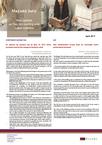
Mazars Info April 2019
CORPORATE INCOME TAX
Q1 advance tax payment due by April 10, 2019: Some procedural and tax law changes to be kept in mind!
For the tax year 2020, if your financial year equals the calendar year 2019 (FY 2019), the due date for the first tax prepayment is April 10th, 2019. If no or insufficient tax prepayments are made, the Belgian corporate income tax due will be increased with a substantial deductible surcharge of 6,75%. This surcharge can be avoided (or reduced) by making timely corporate income tax prepayments at 4 specific quarterly dates. Each payment provides the company with a "credit" that will be deducted from the overall surcharge. A Q1 tax prepayment offers the highest bonification percentage.
Please keep in mind the following practical changes for the performance of the Q1 advance tax payment:
- Advanced tax payments for tax year 2020 should be made on a new bank account number of the Tax Authorities, namely BE61 6792 0022 9117. If the financial year of your company ends on 30/12/19 or before in 2019, the prepayments should still be made on the previous bank account number: BE20 6792 0023 3056.
- In light of the digitalization of the services of the Tax Authorities, the CIT prepayment overview can now, similar to the VAT current account statement, be consulted via MyMinFinPro (https://eservices.minfin. fgov.be/myminfin-web/). The paper overview will no longer be sent via regular mail. All requests for rectification, reimbursement or transfer of prepayments will have to be made via the MyMinFinPro platform as well.
The following changes to the Belgian CIT regime as FY 2019 might impact the calculation of the estimated FY19 CIT tax due:
- The additional assessment of 5,10% on the minimum remuneration of 45.000 EUR is likely to be abolished. Companies that attributed a lower salary are currently fined with a 5,10% tax deductible assessment as from FY18. The 5,10% assessment is levied on the difference between the minimum remuneration of 45.000 EUR and the actual director’s remuneration. The Parliamentary Finance Committee approved the abolishment on March 19th, 2019, but the Federal Parliament should still confirm this via a plenary session. Note that the minimum director’s remuneration will still have to be met in order to qualify for the reduced CIT rate for SME (20%).
- The so-called "exemption for social passive", introduced following the unified status for workers and employees, is also applicable as from January 1, 2019. The measure could apply to companies with employees working for more than 5 years in the company. The advantage of this measure is the (temporary) decrease of the taxable base, which might result in a (temporary) decrease of corporate tax payable for many companies. The CIT exemption has to be spread over a 5-year period.
- Other items that might impact your corporate income tax base and calculation are the new group contribution regime, ATAD interest limitation rules, etc.
VAT
New administrative circular letter for immovable works performed by the tenant.
The Belgian VAT authorities issued an administrative circular letter commenting on the VAT implication of immovable works performed by the tenant in leased premises.
By means of this circular letter (2019/C/22 of March 13, 2019), the VAT authorities provide a VAT analysis of various situations which could occur.
1. The tenant performs the immovable works at its own expense and does not receive any contribution or advantage by the tenant.
To the extent that the tenant has a full right of VAT recovery, the VAT due on the fit-out works can be 100% deducted in the VAT return of the tenant. No VAT taxable transaction takes place between the tenant and the owner. The fit-out works are subject to the 5-year revision period in the hands of the tenant.
2. The owner of the building pays a contribution (in full or partial) to the tenant or grants an advantage to the tenant (lease reduction or lease free period).
This constitutes a taxable transaction from a VAT point of view. The tenant should issue an invoice for the immovable works. The taxable amount of the invoice equals the amount received by the tenant by the owner (contribution in cash, lease free period).
Depending of the VAT status of the owner of the building (VAT taxable or VAT exempt entity), the tenant should issue an invoice without VAT (reverse charge) or with 21% VAT. In the event that the tenant is a VAT taxable entity, filing periodical VAT returns, the tenant needs to issue an invoice using the "reverse charge" mechanism based on which the VAT due is shifted to the owner of the building (article 20 RD n° 1).
The VAT due on the invoices received by the tenant for the fit-out works is deductible in function of the right of deduction of the tenant.
The owner of the building receiving an invoice for his contribution will not be able to deduct the input VAT as long as the owner of the building leases the premises exempt of VAT.
However, should the building be leased with application of VAT (service center, new optional regime for professional lease as from January 1st 2019), the owner of the building will be entitled to recover the VAT.
GLOBAL MOBILITY SERVICES
The mobility budget: the second alternative to company cars.
The modified mobility allowance ("Cash for Car") and an additional measure to reduce Belgian traffic congestion and support eco-friendly commuting, the mobility budget have been approved and implemented as from March 1, 2019.
- The mobility allowance: the conditions have been revised by the Federal Government to make this system more attractive. Now, not only employees who have a company car, but also employees who are eligible for a company car will be able to benefit from the ‘cash for car’ system. Furthermore, the allowance can currently be adjusted to changes in function, e.g. a higher allowance following a promotion with a subsequent higher company car budget.
- Nevertheless, the mobility budget probably will offer more perspective. In practice, employees will have the possibility to spend their mobility budget following three pillars:
- Exchange their existing company car into a more environmentally-friendly type of car. This part will be taxed following the regular company car treatment (in terms of individual and corporate taxation).
- Sustainable means of transport: electric bikes, public transport…: The budget for this pillar will be tax exempted for the employee and 100% deductible for the employer.
- At the end of the year, if the employee has not spent the entire mobility budget, he/she will receive the remaining balance in cash: The remaining part will be subject to social security contributions (38,07%).
We recommend to duly consider both options to make the most beneficial choice for both the employer and the employee. Your Mazars contact is able to calculate the impact on a case-to-case basis, taking each employees’ personal situation into account.
LEGAL
Launch of an electronic share register.
The Federation of the Notarial profession (FedNot) and the Institute for Accountants and Tax Consultants (IAB/IEC) are launching an electronic share register. A welcome innovation in the context of companies’ administrative digitalisation. This tool will lift the administrative burden for companies and increase reliability of the registered data.
The share register is an important corporate tool. It states the identity of its shareholders, mentions the date as from which they have obtained their shares and how many shares each shareholder holds. Moreover with the introduction of the new Belgian Companies Code (which will enter into effect as from May 1, 2019) the principle ‘one share, one vote’, is no longer a mandatory rule. As a result, the share register will furthermore be consulted in order to determine which (voting and profit) rights are attributed to which category of shares.
The current share registers are more than often physical logbooks in which the data is being registered manually. It implies the risk of losing the share register and of incomplete and incorrect data. The reliability and accuracy of the data registered in the share register are the responsibility of the company’s directors.
The introduction of an electronic share register is therefore a welcome innovation, the more so since legislation imposes more and more transparency upon companies regarding their shareholder structure (again, a director’s liability). On September 30, 2019 at the latest companies will have to disclose data regarding their ultimate beneficial owner (the physical person holding 25% or more of the shares or exercising control over the company in another way) to the Federal Public Service Finances (‘FOD Financiën’/’SPF Finances’) via registration in the new online UBO-register. According to the press release from the FedNot and the IAB/IEC the use of the electronic share register would enable the automation of the delivery of UBO-data to the Federal Public Service Finances.
More concrete details on the practical operation of the register are currently not public.
KEEP IN MIND!
- VAT return March 2019 / Q1 2019: before April 20, 2019
- Prepayment corporate income tax: April 10, 2019
- Payment outstanding balance of social security contributions (Q1 2019): April 30, 2019
- Deadline registration for existing partnerships in the Crossroad bank of Enterprises: April 30, 2019
- First monthly prepayment for social security contributions (Q2 2019): May 3, 2019


